Posts Tagged ‘Peace Process’ (90 found)
Truce or Transition? Trends in Human Rights Abuse and Local Response in Southeast Myanmar Since the 2012 Ceasefire
In January 2012, the Myanmar government and the Karen National Union (KNU) signed a preliminary ceasefire agreement, bringing to a halt what is often referred to as the world’s longest-running civil war. This conflict engendered severe human rights abuse of civilians at the hands of a range of armed actors, primarily at those of the Myanmar Armed Forces (Tatmadaw). The ceasefire and other recent political developments in Myanmar have altered the ways in which human rights abuse is experienced by Karen people in the Southeast, and transformed the context within which these abuses can be addressed. This report aims to demonstrate how trends in human rights abuse have changed during the post-ceasefire period […]
• • •The Burma Army and Its Language of Aggression
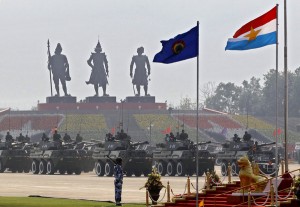 Mixed messages on the peace process came out this week as the government proposed for the first time to commit a substantial amount of money into the peace process. Yet the Commander-in-Chief of the Armed Forces Senior General Min Aung Hlaing’s inflammatory comments on the indestructibility of the Burma Army and blaming the conflict on the country’s ethnic armed groups expose the attitudes of the country’s most powerful institution. Meanwhile, a second round of formal talks between ethnic armed groups and the government’s Union Peace Working Committee on the nationwide ceasefire accord have been postponed until February as ethnic representatives further discuss the accord.
Mixed messages on the peace process came out this week as the government proposed for the first time to commit a substantial amount of money into the peace process. Yet the Commander-in-Chief of the Armed Forces Senior General Min Aung Hlaing’s inflammatory comments on the indestructibility of the Burma Army and blaming the conflict on the country’s ethnic armed groups expose the attitudes of the country’s most powerful institution. Meanwhile, a second round of formal talks between ethnic armed groups and the government’s Union Peace Working Committee on the nationwide ceasefire accord have been postponed until February as ethnic representatives further discuss the accord.
A local newspaper, True News, published comments made by Senior General Min Aung Hlaing at a briefing to officers in Naypyidaw in November 2013. The language of peace and reconciliation was conspicuously absent in his address, “We made peace agreements, but that doesn’t mean we are afraid to fight. We are afraid of no one. There is no insurgent group we cannot fight or dare not to fight.” The Burma Army chief also states that he intends to follow the path laid down by Senior General Than Shwe, the former head of the military junta that suffocated and terrorized Burma from 1988 to 2011. Burma’s underdevelopment, he adds, is “because of internal insurgents who caused conflict in the country.” […]
13-19 January: The Burma Army and Its Language of Aggression
The full text of this week’s issue of Weekly Highlights, including an analysis of current events and news highlights from inside Burma, the region and internationally, as well opinion pieces, actions, statements, press releases and reports from Burma groups and relevant actors.
• •Same Impunity, Same Pattern: Sexual Abuses by the Burma Army Will Not Stop Until There is a Genuine Civilian Government
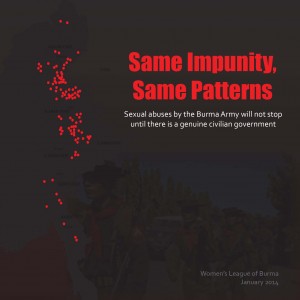 Almost a decade ago, the Women’s League of Burma (WLB) denounced systematic patterns of sexual crimes committed by the Burma Army against ethnic women and demanded an end to the prevailing system of impunity. Today WLB is renewing these calls. Three years after a nominally civilian government came to power; state-sponsored sexual violence continues to threaten the lives of women in Burma.
Almost a decade ago, the Women’s League of Burma (WLB) denounced systematic patterns of sexual crimes committed by the Burma Army against ethnic women and demanded an end to the prevailing system of impunity. Today WLB is renewing these calls. Three years after a nominally civilian government came to power; state-sponsored sexual violence continues to threaten the lives of women in Burma.
Women of Burma endure a broad range of violations; this report focuses on sexual violence, as the most gendered crime. WLB and its member organizations have gathered documentation showing that over 100 women have been raped by the Burma Army since the elections of 2010. Due to restrictions on human rights documentation, WLB believes these are only a fraction of the actual abuses taking place […]
51st Anniversary of Ta’ang National Resistance Day Statement
The 51 anniversary commemorating the armed struggle of all Ta’ang nationals to get free from Myanmar’s dictatorial governments’ oppression falls on 12 January, 2014.
On this remarkable resistance day, we, the PSLF/TNLA Central Committee, send our deepest respect and take great pride in our heroic nationals who gave their lives and lost possessions during the 51 years of the revolutionary road towards the creation of a Ta’ang Nation […]
• • •Filipino Solidarity Activists Call for Inclusion of Genuine Peace and Democratization in Burma in PH-MYA Bilateral Talks
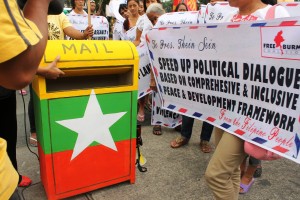 One hundred (100) solidarity activists belonging to the Free Burma Coalition – Philippines (FBCP) today held a symbolic action in front of the Department of Foreign Affairs (DFA) to press for Burmese people’s demands in the second day of Burmese President Thein Sein’s visit to the Philippines […]
One hundred (100) solidarity activists belonging to the Free Burma Coalition – Philippines (FBCP) today held a symbolic action in front of the Department of Foreign Affairs (DFA) to press for Burmese people’s demands in the second day of Burmese President Thein Sein’s visit to the Philippines […]
UNFC Statement on Current Situations
The UNFC puts on record and honors the Laiza Conference of the Ethnic Armed Resistance Organizations, sponsored by the KIO, a member organization of the UNFC, as it was a hundred percent success for unity of the ethnic nationalities. The KIO, together with the Peace-talk Creation Group […]
• • •ျပည္ေထာင္စုျငိမ္းခ်မ္းေရးေဖာ္ေဆာင္ေရး လုပ္ငန္းေကာ္မတီႏွင့္ လက္နက္ကိုင္ တိုင္းရင္းသားအဖြဲ႕အစည္းမ်ား၏ တစ္ႏိုင္ငံလံုး ပစ္ခတ္တိုက္ခိုက္မႈမ်ားရပ္စဲေရး ေတြ႕ဆံုေဆြးေႏြးပြဲ ပူးတြဲထုတ္ျပန္ေၾကညာခ်က္
ျပည္ေထာင္စုျငိမ္းခ်မ္းေရးေဖာ္ေဆာင္ေရး လုပ္ငန္းေကာ္မတီႏွင့္ လက္နက္ကိုင္ တိုင္းရင္းသားအဖြဲ႕မ်ားတို႕သည္ တစ္ႏိုင္ငံလံုး ပတ္ခတ္တိုက္ခိုက္မႈမ်ားရပ္စဲေရး လက္မွတ္ ေရးထိုးႏိုင္ေရးအတြက္ ေတြ႕ဆံုေဆြးေႏြးပြဲကို ၂၀၁၃ ခုႏွစ္၊ ႏိုဝင္ဘာလ (၄) ရက္ႏွင့္ (၅) ရက္ေန႕မ်ားတြင္ ကခ်င္ျပည္နယ္၊ ျမစ္ၾကီးနားျမိဳ႕၊ မဂၽြယ္ခန္းမတြင္ က်င္းပျပဳလုပ္ခဲ့ပါသည္။ ယင္းေဆြးေႏြးပြဲသို႕ […]
• • •Nationwide Ceasefire Accord: Not the End Game
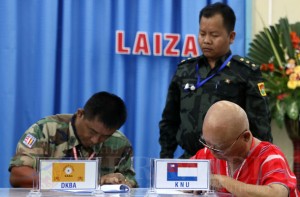 At a historic summit in Laiza, Kachin State, 17 ethnic non-state armed groups agreed to sign the government proposed nationwide ceasefire accord on condition that political dialogue will follow. Of the armed groups who attended this conference, the Restoration Council for Shan State (RCSS) were the only group not to sign, stating that they wanted to consult with Shan political parties and civil society before agreeing.
At a historic summit in Laiza, Kachin State, 17 ethnic non-state armed groups agreed to sign the government proposed nationwide ceasefire accord on condition that political dialogue will follow. Of the armed groups who attended this conference, the Restoration Council for Shan State (RCSS) were the only group not to sign, stating that they wanted to consult with Shan political parties and civil society before agreeing.
A 13-member committee has been formed that will lead negotiations with government minister Aung Min’s peace team in Myitkyina, the capital of Kachin State, starting on 4 November. The conditions to be negotiated with Aung Min include a guarantee that comprehensive political dialogue will be held early next year that will address the role of the Burma Army and greater autonomy for Burma’s ethnic nationalities, something for which they have been fighting for decades.
The 3-day summit was held in Laiza, a town in Kachin Independence Organization (KIO) held territory. Ethnic leaders were greeted by hundreds of supporters on the streets of the town, cheering and singing songs as various leaders arrived. It is of no surprise that ethnic armed groups garner this kind of support. As the summit was being held, Burma Army forces attacked villages in southern Kachin State, displacing around 2,000 people and causing one woman, who was already in bad health, to die while she was sheltering in a church. Burma Army soldiers reportedly opened fire as they entered the five villages under attack […]
Karen National Union Delegation Visits United Kingdom
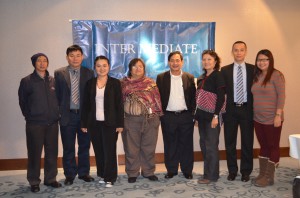 Karen Community Association UK welcomes the Karen National Union (KNU) delegation visiting the UK from 28 October- 1 November 2013. The delegation consists of 7 members including 3 women. The delegation is in the UK to study the peace process in Northern Ireland […]
Karen Community Association UK welcomes the Karen National Union (KNU) delegation visiting the UK from 28 October- 1 November 2013. The delegation consists of 7 members including 3 women. The delegation is in the UK to study the peace process in Northern Ireland […]

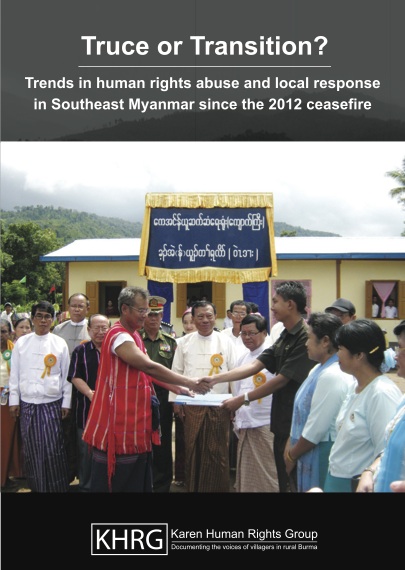








 All posts
All posts